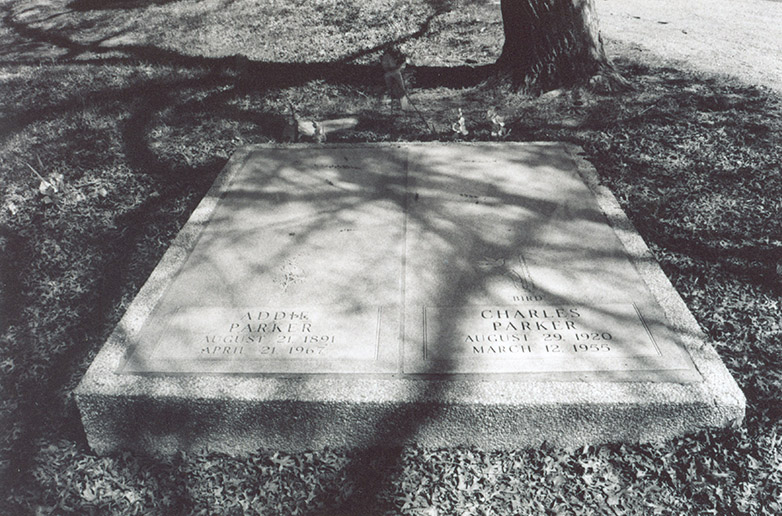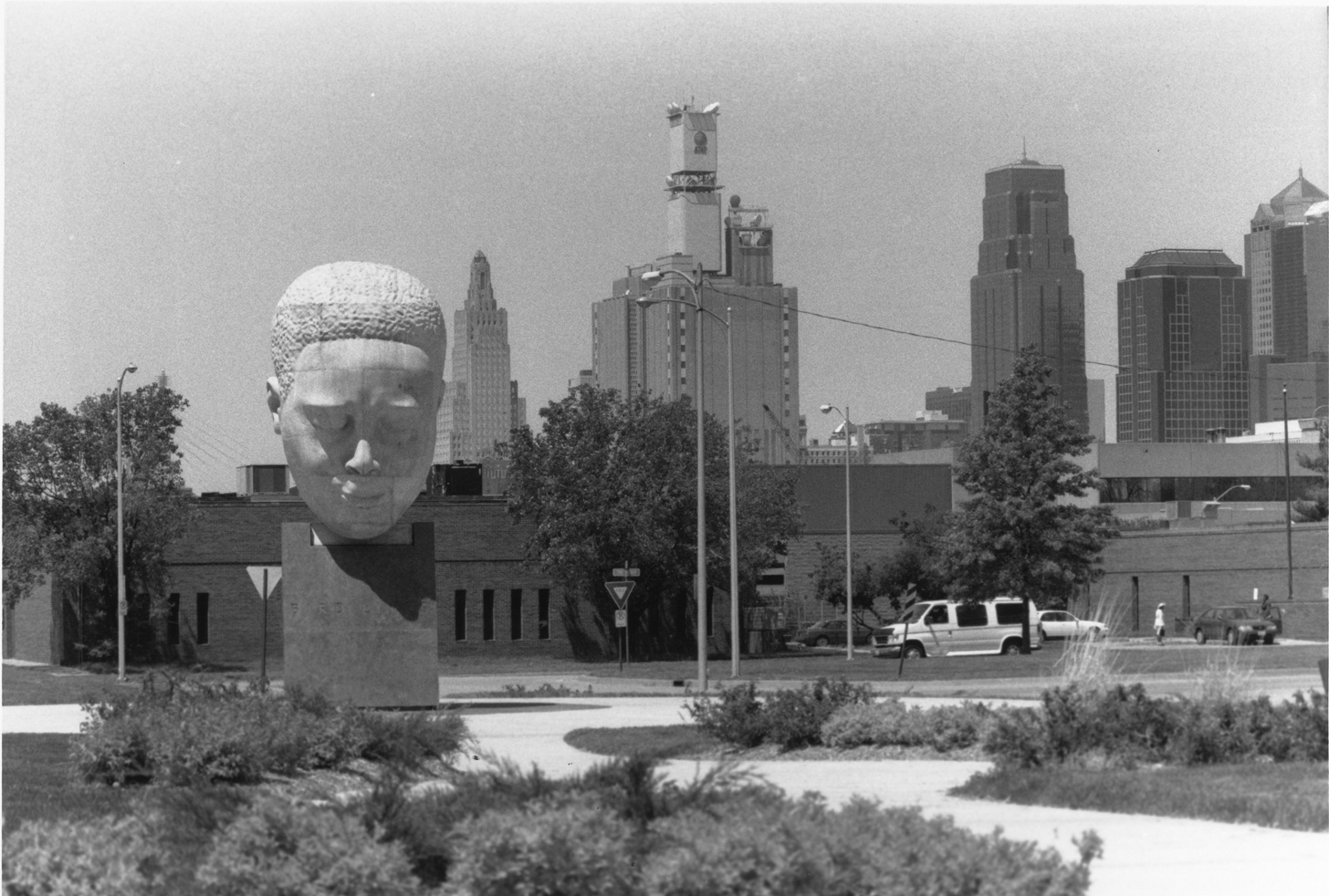Bird Lives
On March 12, 1955, famed jazz musician Charlie "Bird" Parker died following a 15-year addiction to heroin and alcohol. The Kansas City native had become one of the greatest alto saxophonists in the world thanks to his innovations in the "bebop" jazz style.

Parker was born in Kansas City, Kansas, on August 29, 1920. He grew up in Kansas City, Missouri, where he played in jazz clubs as a teenager and young man. The local jazz culture based in the Vine Street nightclub district cultivated his talents as a teenager. Indeed, it was during this period that Kansas City made notable contributions to jazz with hometown artists such as Count Basie, Bennie Moten, and Buster Smith.
With these artists, the Kansas City jazz of the 1930s and 1940s ushered in the era of bebop, a style that Parker came to epitomize. It was an upbeat style that emphasized random harmonic structures rather than adhering to the melody-based compositions used in the traditional big band style.
He only began to accumulate fame after moving to New York City in 1938 at the age of 18. Odd jobs such as dishwashing sustained his musical career until 1940 when he met Dizzy Gillespie, a talented trumpet player. In 1945, Parker and Gillespie joined Max Roach and Miles Davis to record what some believed was the best recording session in jazz history. Among the best-known songs were "Koko," "Now's the Time," "Thriving on a Riff," and "Billie's Bounce."
Unfortunately, much adversity accompanied Parker's meteoric rise to fame and glory. While recovering from injuries sustained in a car accident as a teenager, he became addicted to morphine. He later switched to heroin, and during several rehabilitation efforts he indulged more heavily in alcohol.
Racial tensions also contributed to his drug abuse. When not performing in front of enthusiastic crowds, he was subjected to the same daily indignities of racism as any other black person of the time. Most notably, the media failed to recognize his accomplishments despite his enormous influence on other jazz musicians. Reporters instead chose to focus on the non-conformist culture surrounding bebop musicians, portraying Parker as something of a spectacle rather than a serious musician.
His stardom finally improved considerably after a sensational 1949 trip to France where the media noted his popularity with French audiences and musicians. By 1950, Parker had finally gained attention in America as perhaps the greatest alto saxophone player of all time.
Still, the belated recognition only temporarily lifted Parker's spirits. The death of Parker's two-year-old daughter in 1954 and his subsequent split with his common-law wife, Chan Parker, led him into a deep depression. Suffering from depression, ulcers, and severe cirrhosis of the liver, Parker contracted pneumonia at the age of 34 and died a week later in his hotel room.

Shortly following his death, graffiti around New York paid homage to Charlie Parker with the simple message, "Bird Lives." Today this quaint phrase serves on monuments, biographies, websites, and documentaries to remind future generations of Parker's extraordinary contributions to the history of music.
Read biographical sketches of people important to Kansas City jazz during the mid-twentieth century, prepared for the Missouri Valley Special Collections, Kansas City Public Library.
- Biography of Charlie "Bird" Parker (1920-1955), jazz great, by Elonda Clay
- Biography of Bennie Moten (1894-1935), pianist and bandleader, by David Conrads
- Biography of Claude Williams (1908-2004), musician, by John A. Horner
- Biography of William "Count" Basie (1904-1984), pianist and bandleader, by Susan Jezak Ford
- Biography of George E. Lee (1896-1958), singer and bandleader who organized a band with a 17-year-old Charlie Parker, by David Conrads
- Biography of Jay McShann (1916-2006), KC pianist and bandleader whose orchestra featured Charlie Parker, by Jeremy Drouin
- Biography of Florynce R. Kennedy (1916-2000), civil rights activist and lawyer who once represented Charlie Parker, by Susan Jezak Ford
- Biography of Julia Lee (1902-1958), singer and pianist, by David Conrads
- Biography of L.C. "Speedy" Huggins (1913-1999), dancer and musician, by David Conrads
- Biography of Andy Kirk (1898-1992), leader of the Clouds of Joy band, by David Conrads
- Biography of Milton Morris (1911-1983), nightclub owner, by David Conrads
- Biography of Lester Willis Young (1909-1959), tenor saxophonist, by Jeremy Drouin
- Biography of Joe Turner (1911-1985), blues vocalist, by David Conrads
Check out the following books about Charlie Parker and Kansas City Jazz.
- Chasin' the Bird: The Life and Legacy of Charlie Parker, by Brian Priestley
- Bird Lives! The High Life & Hard Times of Charlie (Yardbird) Parker, Ross Russell
- Kansas City and All That's Jazz, by the Kansas City Jazz Museum
- Goin' to Kansas City, by Nathan W. Pearson, Jr.
- Kansas City Jazz: From Ragtime to Bebop-A History, by Chuck Haddix and Frank Driggs
- Celebrating Bird: The Triumph of Charlie Parker, by Gary Giddins
- Yardbird Suite: A Compendium of the Music and Life of Charlie Parker, by Lawrence Koch
- Bird: The Legend of Charlie Parker, by Robert George Reisner
Check out Charlie Parker on CD at the Kansas City Public Library, "Now's the Time."
View the following documentaries on Charlie Parker and the history of jazz.
- "Celebrating Bird: The Triumph of Charlie Parker," T. Byron/Multiprises, 1987, by Gary Giddins
- "Last of the Blue Devils," Rhapsody Films, 1979; featuring Count Basie and his orchestra, Joe Turner, and Jay McShann
- "Jazz," PBS Home Video, 2000, by Ken Burns
Visit the following museums and attractions related to Charlie Parker and Kansas City Jazz.
- The American Jazz Museum, 1616 E. 18th St., Kansas City, MO 64108; phone (816) 474-8463, located in the 18th and Vine District
- Visit Charlie Parker's gravesite at Lincoln Cemetery, 8604 E. Truman Road, Kansas City, Missouri
Continue researching Charlie Parker and Kansas City Jazz using archival material from the Missouri Valley Special Collections at the Kansas City Public Library.
- Celebrating Kansas City's Rich Jazz Heritag; biographical notes about 47 internationally recognized jazz musicians with strong ties to Kansas City
- Vertical File: Parker, Charlie (Bird)
- Harvey Rettberg Papers
- Kansas City...and All That's
References:
Kansas City Jazz Museum. Kansas City and All That's Jazz. Kansas City, MO: Andrews McMeel Pub., 1999.
Pearson, Nathan W., Jr. Goin' to Kansas City. Urbana & Chicago, IL: University of Illinois Press, 1987.
Priestley, Brian. Chasin' the Bird: the Life and Legacy of Charlie Parker. New York: Oxford University Press, 2006.


